As a child I loved myths. Magical stories that existed beyond my world and outside of time, they just were. In my post Return to Tanglewood,, I wrote about my love for Nathaniel Hawthorne’s Tanglewood Tales, classical myths for children. My love for Norse mythology came a few years later and captured my imagination more profoundly.
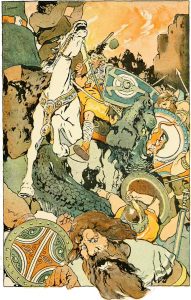 While sunny Olympus endures forever, snowy Asgard lives in the shadow of Ragnorok, the death of the gods and the destruction of the world. Having lived through my parents’ violent divorce, I could imagine an inevitable and cataclysmic battle that destroys the world.
While sunny Olympus endures forever, snowy Asgard lives in the shadow of Ragnorok, the death of the gods and the destruction of the world. Having lived through my parents’ violent divorce, I could imagine an inevitable and cataclysmic battle that destroys the world.
I don’t remember what books of Norse myths I read back then, but the stories riveted me. But the books I encountered as an adult seemed flat and academic. I figured the problem was me, that my adult self had outgrown the enchantment of Norse mythology. But when I reread the Tanglewood books, Hawthorne’s narrative rekindled my childhood delight.
A myth, like any other story, needs a skilled storyteller.
The Norse myths have found their storyteller in Neil Gaiman.
I rediscovered the magic of the Northern myths listening to the audio version of his Norse Mythology. Gaiman reads the book himself, with a wonderful understated expressiveness that never strains for effect. I listened every night in bed before off to sleep—like having my own personal reader of bedtime stories.
I remembered some of the myths from childhood—the fleet-footed peasant boy who can’t outrace Thought, the frost giant who tricks Thor into trying to drink the ocean, the time Loki vanishes Sif’s beautiful hair and leaves her bald.
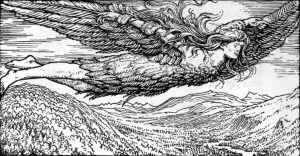 Of all the characters in Norse mythology, my favorite was Loki, the trickster.
Of all the characters in Norse mythology, my favorite was Loki, the trickster.
From my middle school perspective, Loki was like the class clown, always pranking the other gods. He can talk anyone into anything. He changes his shape at will. I failed to understand fully the darkness in Loki. His malice seemed containable because he fears the wrath of his fellow gods enough to undo the damage he causes—for a time, anyway.
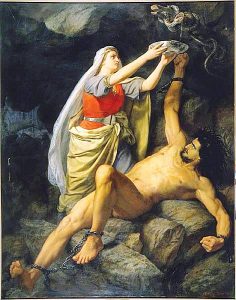 I forgot the dark conclusion of Loki’s story, perhaps because I liked him so much. In the end, his envy and malice overwhelm fear of punishment. He contrives the death of the god Baldr. For that crime he’s doomed to suffer torment, bound in a cave while poisonous serpent’s venom drips on him, until the coming Ragnorok frees him to fight with the armies of darkness.
I forgot the dark conclusion of Loki’s story, perhaps because I liked him so much. In the end, his envy and malice overwhelm fear of punishment. He contrives the death of the god Baldr. For that crime he’s doomed to suffer torment, bound in a cave while poisonous serpent’s venom drips on him, until the coming Ragnorok frees him to fight with the armies of darkness.
Norse Mythology captures all the grimness, heroism and humor of the Northern myths. Neil Gaiman has drunk deep of the Mead of Poetry.

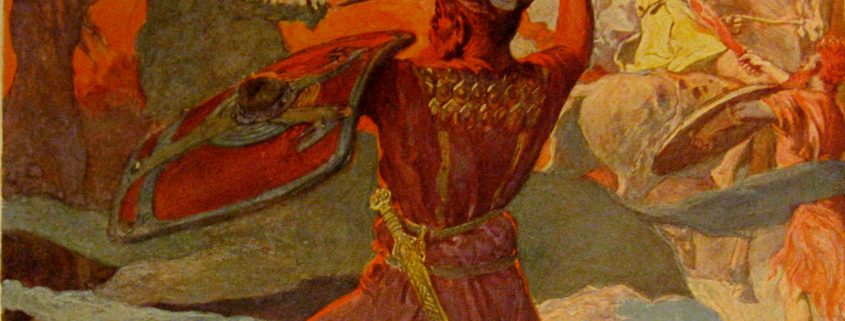
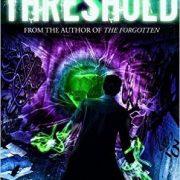





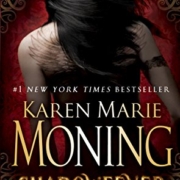






Leave a Reply
Want to join the discussion?Feel free to contribute!